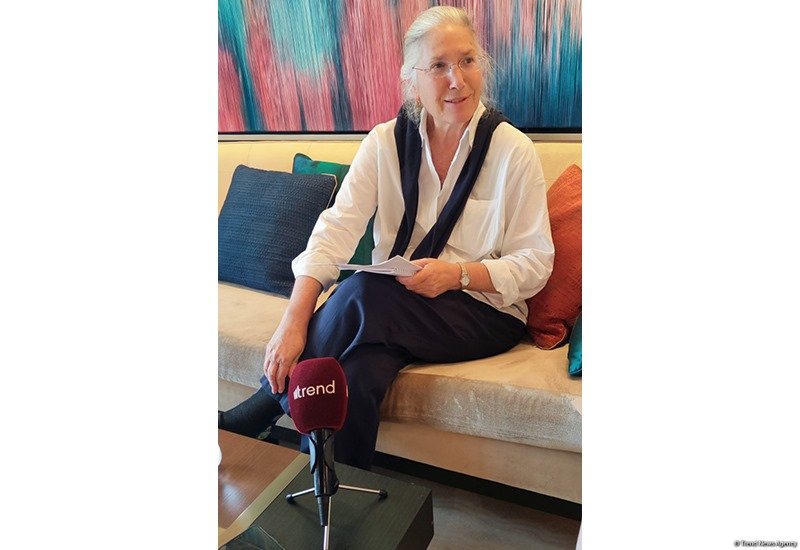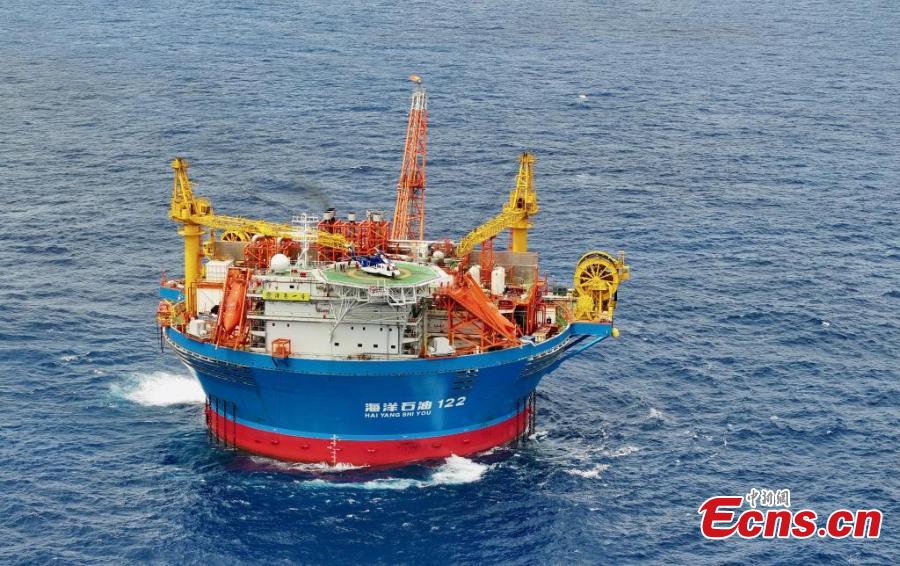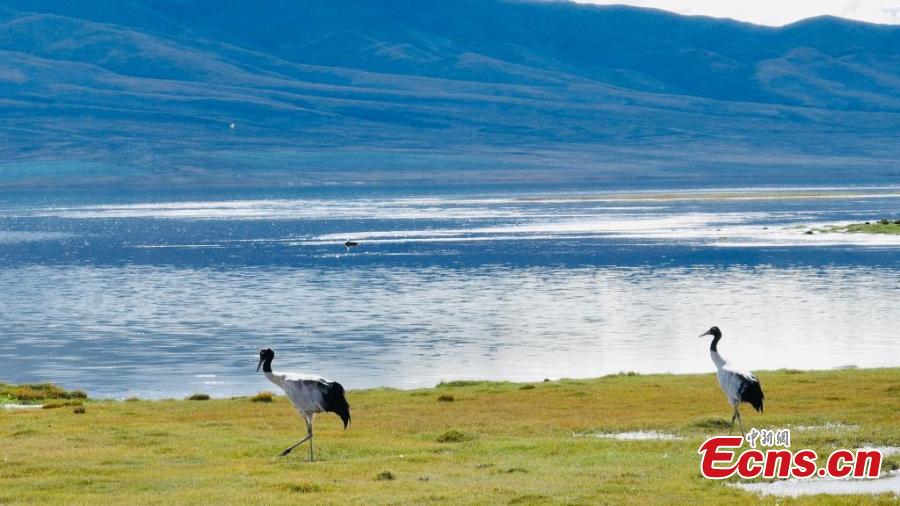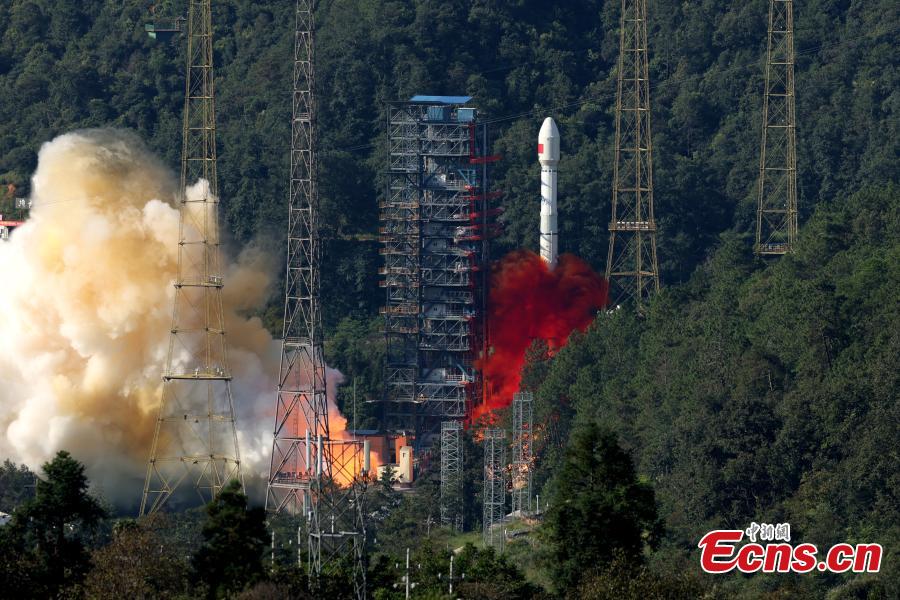
The US,Azerbaijan and China will hold a triple-hosted event at COP29, SueBiniaz, the US State Department’s Principal Deputy Special Envoyfor Climate, said in an exclusive interview with , as she visitedBaku. "It's been a real pleasure to have another opportunity to talkto the Azerbaijani team about COP29. We've discussed severalissues, as we normally do when we're able to get together.
We,first of all, talk about several issues that are under negotiationat COP29. One of them relates to Article 6 of the Paris Agreement.Not to get too technical, but that article deals with marketmechanisms and emissions trading between parties.

It's almost done,but has a few outstanding issues, and we have a common interestwith the host country in getting those issues done at this COP. Wealso talk about mitigation. That was a very important outcome oflast year's COP," she said.
Biniaz pointed out that the first Global Stocktake under theParis Agreement led to something, a rather lengthy decision, a partof which was devoted to mitigation and reduction of emissions andit almost provides a roadmap to keeping the global temperature riseto below 1.5 degrees. "We want to make sure that it stays alive and that part of theCOP29 outcome refers to it, recalls it, and implements it.
Thebiggest issue that's under negotiation this year is on the newcollective quantified goal, which many people call NCQG for short.The developed countries in 2009 committed to a goal of mobilizing$100 billion for the benefit of developing countries every yearstarting in 2020. When the Paris Agreement was concluded, thequestion was do they continue this goal? Who contributes? How much?In 2015 they decided to extend the goal through 2025 and thenrevisit it and update it this year, in 2024, so basically at COP29.
The issues this year include what kind of goal are we talkingabout, how much money, who contributes, etc. That's the big marqueeitem that is up for negotiation at COP29," said the deputy specialenvoy. Biniaz went on to add that the other thing that the US has beentalking to the Azerbaijani team about are things that are notactually part of the COP, technically speaking, but the COP can addmomentum to these issues.
"One of them is that the first transparency reports under theParis Agreement are due on December 31, just a few weeks after theCOP. So we have a common interest in promoting timely submission byparties to the Paris Agreement of these reports. These are calledBiennial Transparency Reports (BTRs).
Also, the next round of ParisEmission Targets, or Nationally Determined Contributions, are duein a couple months after the COP, February 10 to be exact. So wehave also a common interest with Azerbaijan in promoting timelysubmission of NDCs that are ambitious and help to keep this 1.5degree limit within reach," she said.
Biniaz highlighted that one area of focus for the United Statesand other parties at COP29 is going to be the negotiationissues. "Those are kind of the mandatory things that need to be decidedat COP29. Then there's a whole set of other things that we'refocused on that, broadly speaking, are called the action agenda.
Those are the things that are not, strictly speaking, negotiated,and definitely not negotiated among 200 countries. They may benegotiated among smaller groups of countries, or they might just beevents or announcements by one or two or several countries. As partof the action agenda, Azerbaijan has its own priorities, and we'reinvolved in some of those, and those will be priorities for us.
We'll also have some US priorities at the COP. Some of those relateto mitigation, some of them adaptation, some of them finance. Infact, we are doing an event with China and Azerbaijan, kind oftriple-hosted, focusing on the gases other than carbon dioxide.
This is going to be one of the high-level events during the firsttwo days, during the Leaders' Summit, and we're looking forward tothat. Another thing we're focusing on is the US Center. Every yearat the COP, we have our own show place, where we put on manyevents.
This year, I think it will be about 50 events that the USputs on. It's a chance to showcase what the United States is doingat home, what our subnational governments, cities, states are doingand what we're doing internationally with other countries," sheexplained. She pointed out that the major issue under negotiation is thisnew collective quantified goal, the NCQG, and that's the successorto the existing $100 billion goal.
"So there we see a concrete outcome in the form of a decision ofthe parties. We're focused on maybe four aspects at least. One isthat we think this goal needs to have more than one layer.
We thinkit has to have one component that focuses on how much money in theworld needs to go into the climate issue, both to keep 1.5 degreesalive and also to promote global resilience and adaptation toclimate impacts, and we've been referring to that as a globalinvestment goal. That includes all countries.
It includesinternational finance, domestic finance, etc. It's a large number.The second layer we refer to as the support goal, and that's morelike the $100 billion.
It's more like what certain contributors endup contributing towards developing countries in terms of publicfinance, but also the private finance. The third point is that thatsupport goal, the inner layer, needs to be a realisticallyachievable number. It needs to kind of stretch the parties to alittle beyond their comfort zone, but it can't be some kind ofnumber that is just unachievable and will interfere with thecredibility of the Paris Agreement process.
The fourth point isthat that support goal, we think, needs new contributors. We thinkwe need more countries to join the group of contributors, thosethat are capable of being contributors," the deputy special envoyadded. Further, Biniaz noted that high-integrity carbon marketsrepresent a potentially promising channel to unlock significantadditional capital and greenhouse gas mitigation.
"I say potentially promising because they have to be done right.If they're done right, carbon markets can support decarbonization,help limit global average temperature increase to 1.5 degrees, andleverage private sector action.
So it's important to the UnitedStates that we shape responsible design, implementation, and use ofmarket-based measures. And we're pursuing that goal in a number ofdifferent ways. Internationally, we're deeply involved in ensuringthe integrity of the CORSIA mechanism.
That's something that wasdesigned within the International Civil Aviation Organization as anoffset mechanism for emissions from the international aviationsector. We're also working with global certification mechanismsunder the World Bank and high-quality carbon market initiativeslike the LEAF coalition, which has to do with avoidingdeforestation, and the Energy Transition Accelerator, which helpsdeveloping countries move towards clean energy. This COP is goingto be focused very much on completing the guidelines under Article6, and we're pushing for high-integrity outcomes with respect tothe Article 6 guidelines," she said.
Biniaz highlighted that the US is working with Azerbaijan inmany different ways to promote the success of COP29. "From the very beginning, after Azerbaijan was named as theCOP29 president, we've been discussing the issues that are undernegotiation, ones that I've already mentioned, including ways topromote the successful submission of these biennial transparencyreports, NDCs in February, etc. The second thing is that we've beenco-leading, or we will be co-leading certain initiatives with thegovernment of Azerbaijan.
We co-hosted a workshop recently for thebenefit of African countries on getting their biennial transparencyreports ready to go for the deadline at the end of this year. As Imentioned, with China, US and Azerbaijan, we're putting togetherthis high-level event on non-carbon dioxide greenhouse gases. It'sthe second time we will be doing that kind of event.
We did one atCOP28 when the UAE was the president, and this time we're going todo it with Azerbaijan," she said. Biniaz went on to add that the third thing is that the US issupporting many of the Azerbaijani initiatives and events for thisCOP. "We'll be attending many of them next week in New York atClimate Week, and we're supporting many of the declarations thatthe COP presidency has put forward for adoption at COP29.
We'revery impressed with the Azerbaijani team. I think they've done agreat job. They were given this COP29 assignment kind of abruptly,pretty late by the standards of the COP, and they really jumped inand have really done a great job learning the issues and exercisingleadership," she said.
The deputy special envoy pointed out that the push toward greenenergy will definitely feature at COP29, so it's great to seeAzerbaijan taking a leadership role on this issue. "The US and Azerbaijan have a long history of cooperation onenergy security, and we support, of course, the transition intogreen energy. US companies, whether they're big or small, areinterested in entering the green energy market and cooperating withAzerbaijan on new technologies, and we definitely encourage thesepartnerships.
Azerbaijan has shown with the Southern Gas Corridorthat it's a reliable supplier of gas to Europe, and this lends alot of credibility to Azerbaijan's plans to expand the model intothe renewable energy sector and become a green energy supplier toEurope," she said. Further, Biniaz noted that the US looks forward to learning moreabout the Green Energy Corridor project, including potentialopportunities for the US government and the US private sector toget engaged. "More broadly, we're interested in continuing to learn about thepotential of offshore wind to help decarbonize the Azerbaijanipower system, to advance the industrial transition, and to spurpotential export opportunities.
We also want to underline thatthere's strong potential in Azerbaijan for other renewable energydeployment, given solar and wind resources. US companies of allsizes and shapes are interested in entering the green energy marketand cooperating on new technologies. Our excellent cooperation onCOP29, is a proof of concept that when we work together on sharedinterests, we can have a successful outcome that benefits both ourcountries and beyond.
And there are many areas beyond climate wherewe have a common interest, including clean energy innovation,regional peace and security, and we would like to continue tocooperate on these shared interests," she concluded..










